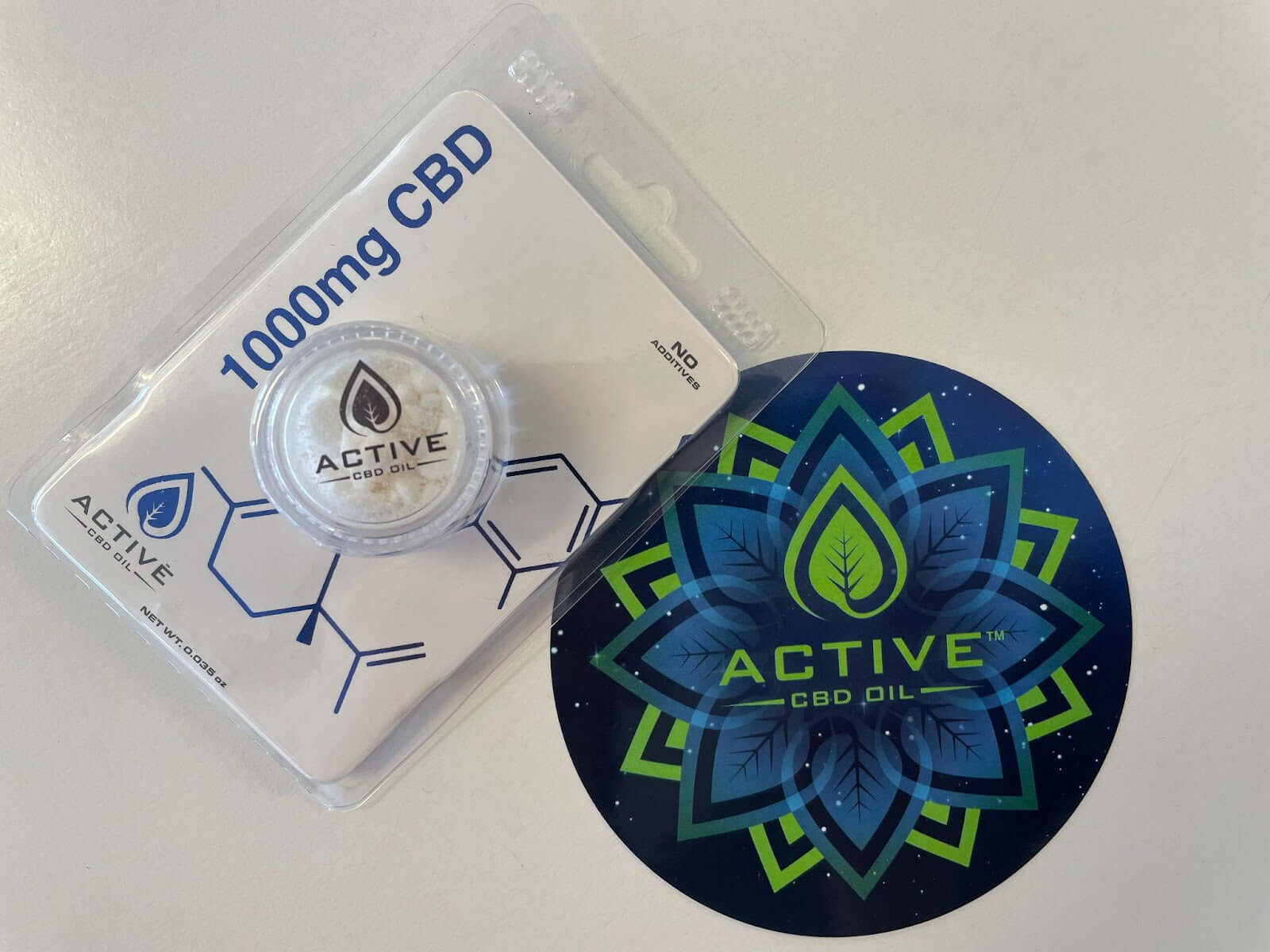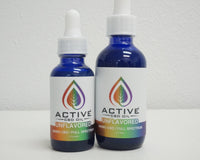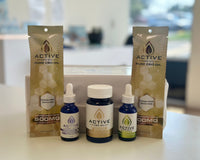In hemp plants (Cannabis Sativa L) there are suggested to be over a hundred plus different cannabinoids and chemical compounds that we are continually learning more about as research progresses. Among the most known cannabinoids are cannabidiol (CBD) and tetrahydrocannabinol (THC), which produce their own unique effects and have their own potential therapeutic benefits. One of the most common questions frequently asked by people interested in trying CBD for the first time is “How does CBD make you feel?” It is important to understand how any new supplement will make you feel and taking CBD oil is no exception to this. There is often a lot of concern that taking a product extracted from a cannabis plant might cause psychoactive effects or a high, however this is not the case when taking CBD. Instead the cannabinoid THC produces psychoactive effects and is what makes you feel high. The short answer we often share with new consumers is that CBD is non-intoxicating unlike its brother cannabinoid THC and CBD oil tends to have a calming, yet uplifting effect for most individuals. Although we all have our unique endocannabinoid system and therefore receive each cannabinoid differently in our body so therefore results may vary for everyone. In this blog we will explore more about how CBD works in our body with our endocannabinoid system and describe how cbd oils make you feel.

Introduction to the Endocannabinoid System
In order to better understand how CBD makes you feel, it may be helpful to first see how it works in the human body. Research shows that CBD interacts in our body with a naturally occurring system found in all mammals called the endocannabinoid system (ECS) that plays a vital role in regulating homeostasis or balance within the body. This is why it is suggested that cbd helps with such a plethora of various conditions and ailments. The ECS consists of three main components; the cannabinoids, cannabinoid receptors and enzymes. We produce our own endocannabinoids that are made from fat-like molecules within cell membranes that are made as needed whenever the body observes an imbalance. The first endocannabinoids found were Anandamide (AEA) and 2-arachidonoylglycerol (2-AG), which are said to have a similar molecular structure as phytocannabinoids coming from the plant such as CBD. These endocannabinoids bind to our cannabinoid receptor sites CB1 which is found in the brain central nervous system (CNS), and CB2 found outside of the CNS and in cells of the immune system. The cannabinoid receptor sites CB1 and CB2 are like locks and located at cell membranes and cannabinoids are like the keys that fit into them to trigger a cellular response to initiate homeostasis. Finally there are the enzymes that are designed to deconstruct the endocannabinoids after they have served their purpose. AEA is broken down by Fatty acid amide hydrolase (FAAH) and 2-AG is broken down by Monoacylglycerol lipase (MAGL). Each component of the ECS works in tandem with each other to bring the body to homeostasis and make up what is called our endocannabinoid tone, that encompasses the amount of endocannabinoids in our body, the speed they are made and broken down, and the density of receptors in our brain.

CBD as a reuptake inhibitor
Some studies suggest that many issues such as fibromyalgia, migraines, irritable bowel syndrome, and other treatment resistant conditions could be linked to having an abnormal level of naturally occurring endocannabinoids, or a condition called clinical endocannabinoid deficiency (CECD). Although CBD has been evaluated to have a low affinity to bind to either CB1 or CB2 receptors, it has been suggested to modulate several ion channels and non-cannabinoid receptors. CBD may also function via different receptor-independent pathways by delaying the reuptake of endogenous neurotransmitters like AEA and adenosine, as well as inhibiting or improving the binding action of certain G-protein coupled receptors. Researchers at the department of Biochemistry and Cell Biology, Sony Brook University, New York have gathered scientific evidence that shows that CBD has the ability to act as an AEA reuptake and breakdown inhibitor. To be more precise, CBD inhibits the FAAH enzyme that breaks down AEA, which plays an important role in maintaining our endocannabinoid tone by ensuring we have higher levels of endocannabinoids and combat CECD.
The potential anti-anxiety and anti-inflammatory benefits of CBD may be in part attributed to its ability to inhibit adenosine reuptake. CBD is suggested to increase the level of adenosine by delaying the reuptake of this neurotransmitter. This then helps regulate the adenosine receptors A1A and A2A activity, which have a wide range of anti-inflammatory effects and play an essential role in cardiovascular function by regulating myocardial oxygen consumption and coronary blood flow in the body.
Interactions with G-proteins
Another group of scientists from the Institute of Psychiatry from Federal University of Rio de Janeiro conducted a study to investigate the potential antidepressant and anxiolytic effects of CBD. They observed that CBD showed non-activation of CB1 and CB2 receptors, however there were positive interactions with CBD activating 5-HT1A (hydroxytryptamine) serotonin receptors. These G-protein receptors demonstrate a range of different biological processes such as pain perception, addiction, sleep, nausea, vomiting, appetite, and anxiety.
CBD is also suggested to function as an antagonist that deactivates or blocks another G protein coupled receptor called GPR55. This G-protein is typically found in the brain, particularly in the cerebellum and it plays an important role in adjusting bone density and blood pressure. GPR55 also is suggested to encourage osteoclast cell function which makes it easier for bone reabsorption and overactive signaling has been associated with developing a condition called osteoporosis that causes bones to become frail. CBD has been studied for its potential to decrease both cancer cell proliferation and bone reabsorption by blocking GPR55 signals.

CBD as an Allosteric Modulator
Another way that CBD may interact with various receptors in our body is by acting as an allosteric receptor modulator, meaning that it can have direct influence on how a receptor transmits a signal by changing the shape of the receptor resulting either inhibiting or enhancing the signals sent out.
Positive allosteric modulator
Researchers from University of Sydney, Australia conducted a study that demonstrated CBD acting as a positive allosteric modulator of the GABA-A receptor by increasing its binding affinity for its endogenous agonist called gamma-aminobutyric acid (GABA). This is the main inhibitory transmitter in our CNS and is responsible for the sedative effects of Valium. CBD is suggested to help lower anxiety by altering the shape of the GABA-A receptor so that it magnifies the relaxing effect of GABA.

Negative Allosteric Modulator
Canadian scientists conducted a study that revealed CBD as being a negative allosteric modulator of the cannabinoid CB1 receptor. Unlike THC that does bind directly to CB1, CBD interacts with the CB1 receptor so that it decreases its potential to bind with THC. This is often why people may not feel as much psychoactive effects after consuming higher levels of THC when taken with CBD, and why a full spectrum CBD oil derived from hemp that contains trace amounts of 0.3% or less may still yield some of THC's potential therapeutic benefits without any high effects. This study presented the science to answer the question of “Does CBD keep you from getting high?” CBD is a non psychoactive drug that inhibits THC oils that get you high, providing a more balanced experience for individuals who want to gain the potential benefits of both cannabinoids without the negative side effects of higher levels of THC such as increased anxiety and paranoia.
How long does cbd make you feel calm?
As we have discussed, many consumers of CBD report that they feel calm however since we all receive CBD differently the time that it may take for this potential effect to kick in and the possible duration may vary. One of the most prominent factors that determines how long non psychoactive CBD oil may make you feel calm is the method of consumption chosen.

Vaporizing: E-juice and Isolate Dabs
While vaporizing is the fastest-absorbing method, it is also the quickest to leave your body. Customers often share great results with this route of consumption for conditions like anxiety, migraines, daily stress, etc. and for those who need an immediate effect. Most customers looking for pain relief are not able to solely rely on this method of consumption due to the necessity of redosing frequently, but some use vaping as part of their daily CBD regimen.

Sublingual: Tinctures/Oils
Due to all of the blood vessels under our tongues, products applied under the tongue are maximally absorbed. Sublingual application usually takes around 15-20 minutes to begin working and typically lasts for 4-6 hours. This is the most popular method of consumption for any condition.

Swallowed: Capsules/Edibles/Water Soluble Tinctures
Ingested products such as cbd edibles will typically take around 45 minutes to 1 ½ hours to absorb and usually lasts 8-10 hours. This is a popular option for those looking for a longer lasting product compared to tinctures/oils. Many customers use this product to relieve pain, better sleep, reduce daily stress, etc. There are also our water soluble tinctures that can be mixed in with food or drinks for the same delivery method as ingestion, while offering a much higher bioavailability or percentage of CBD absorbed.

Transdermal Patches
Although transdermal patches are applied topically, they are different from most topical products like salves and lotions because they are specifically designed to absorb across the skin into the bloodstream, and are suggested they are effective system-wide rather than at a surface level and localized area with other topical applications. Transdermal patches typically allow the CBD to be absorbed within a few minutes and act as a slow release over a longer period of time. Our Active CBD Oil Transdermal patches have an extended wear time of forty-eight hours, and offer the longest potential duration of feeling a calming effect from CBD. Another great feature about our transdermal patches is that they contain four percent lidocaine that may offer a numbing effect to help manage pain even more!
What does CBD Oil look like?
The way CBD looks will depend on what kind of product you are looking to take and what category of CBD products it may fall in between full spectrum, broad spectrum, or isolate.

Full spectrum CBD
Full spectrum CBD oils are made using the full hemp extract making use of all of its naturally occurring compounds including over a hundred different other cannabinoids, terpenes, flavonoids, and amino acids. Often these oils are called raw oils meaning that they retain all of the naturally occurring components of cannabis sativa L used including some plant constituents such as chlorophyll pigments that give them a darker green color and tend to be much thicker and viscous in consistency. Full spectrum oils derived from hemp will have THC present, with no more than 0.3% which is suggested to not be a high enough amount to produce any psychoactive effect. Most cbd products will have third party lab testing so you can be assured that your product will not cause mental impairment.

Broad Spectrum CBD
Broad Spectrum CBD oils are the next step in refinement after taking a full spectrum oil and removing the phytochemicals such as the chlorophyll and the cannabinoid THC using a process called chromatography. This results in a broad spectrum cbd oil having a more golden color to them, that has a thinner viscosity than a full spectrum oil. Much like full spectrum CBD oil, broad spectrum will contain other cannabinoids besides CBD such as CBG, CBN, and CBC that helps encourage the entourage effect where all the individual compounds work better as a team effort.

CBD isolate
CBD in its purest form completely removed from the rest of the hemp plant will typically come in the form of a white CBD isolate powder. The isolate powder is the biggest bang for your buck getting the highest amount of milligrams of CBD for the lowest price. It is also extraordinarily versatile as it can be taken directly by holding under the tongue or swallowing, mixing in with food or drinks, smoked or vaped, or used to make your own CBD tinctures, topicals, edibles, and vaping products. Check out our other blog that explains in more detail all the various ways you can use CBD isolate to make your own CBD oil products!
Hemp Oil vs CBD Oil
If you have ever asked yourself does hemp oil relax you found the right place for an answer. There are actually a lot of misconceptions from people thinking that hemp oil and CBD oil are the same, however this is not the case. The main difference is that hemp oil will be extracted from the hemp seeds which do not contain a significant amount of CBD whereas CBD oil is extracted from parts of the hemp plant rich in CBD such as the stalks, leaves and flowers. Korean researchers conducted a study to discover the actual amount of CBD in hemp seed oil and measured concentrations from 6.66 to 63.40 μg/ml. Note that this measurement is in micrograms when typical doses are in milligrams so this would equate a little as 0.00666 mg/ml CBD to 0.0634 mg/ml. To put this into perspective the lowest milligram per milliliter dropper from a tincture bottle we carry is 10 mg/ml in our Active CBD Oil 300 mg CBD/MCT oil tinctures. That being said, hemp oil generally does not contain enough CBD to produce any sort of relaxing effects, however it is still suggested to have essential fatty acids that could have their own potential benefits.

Do you feel anything when you take CBD?
If you have ever heard of the phrase “you never know what you have until it’s gone” then you may have a fair understanding of what you might potentially feel or rather not feel when taking CBD. We regularly hear excellent feedback from customers who share that CBD has helped them to not experience or feel their issues to the same extent as they may normally do. For example many people dealing with chronic pain report that CBD oil has helped them manage their pain levels and in a sense, CBD has helped them to not feel their normal pain. Several people have told us that after being out of their supply of CBD oil for a few days to a week that they start to notice they are experiencing their normal level of pain again. Sometimes not feeling anything is what people are truly looking for when it comes to managing their conditions and ailments.
Before starting a new regiment using CBD it is best to seek the advice of a medical professional to ensure that there will not be any conflicts with any prescription medications you may be taking.
There is a lot of information to sort through when exploring how does CBD make you feel so if you have any questions about finding the best CBD for you our team is always happy to help if you visit any of our retail locations, chat with us at https://discovercbd.com, or give us a call toll-free at 1-844-GO-CBD-NOW (462-2366).

























